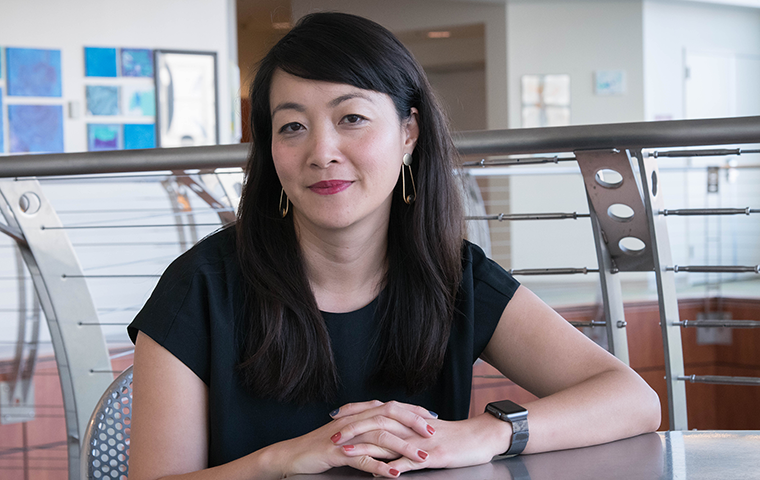
Professors Have It, Too
College is taxing on your mental health, says SCU Communication Assistant Professor Chan Thai. Talking about it can help.
When Chan Thai entered UC Berkeley as a first-year student in fall 1999, she felt ill-prepared for the culture of hyper-competitiveness and 24/7 hustle that she found in this part of her native Bay Area.
“I went to a public high school for performing arts, whereas a lot of the other students at Berkeley had gone to private schools, boarding schools, or more academically competitive public schools. They were way ahead of the game in my mind, so I felt like I was playing catch-up from the start,” said Thai, now an assistant professor of communication at Santa Clara University. She internalized the stress for the first time in her life of feeling like she wasn’t immediately “the best.”
The transition was tough for Thai, a first-generation college student whose Vietnamese refugee parents had the equivalent of middle school- and elementary school educations. But she quickly found her “happy place” in the media studies department, and double-majored in social work. In addition to working a 30-hour per week job her junior and senior years to help pay for school, she heaped extracurriculars on her plate, including running an undergrad seminar course with the public health club.
After college, “I was completely burnt out. I didn’t know exactly what I wanted to do so I took some time off. I lived in San Francisco, worked odd jobs like retail, nannying, event planning, costuming. All I cared about was paying my rent and going to see shows,” the avid concert-goer said. Yet she now realizes it was a brilliant, necessary period of self care. “I realized there was more to life than school and getting A’s.”

Chan Thai on Brighton Beach in England during her senior year of college in 2002. Photo provided by Thai.
Back to School
Four years later, Thai went back to school to get her master’s degree in public health at UCLA, and then her Ph.D. in communications at UC Santa Barbara. It was fairly smooth sailing, Thai said, until about three years in, during the taxing qualifying exam process in which doctoral candidates write and defend three 40-page papers on different topics in one 10-week quarter. It was then that she hit her breaking point.
“I would wake up in a panic; I’d think, ‘I should already be at the library or my office.’ My to-do list was impossible to complete. I just stopped doing stuff for myself,” she said. The pressure of needing to be constantly productive, combined with personal tragedies including her father’s cancer diagnosis and the deaths of both her grandmothers, spiked the anxiety that Thai had never fully dealt with years before at Berkeley.
Addressing the anxious elephant in the room was the first step in coming back to equilibrium, she said. “I think people [in my graduate program] were afraid to talk about the pressure because that somehow meant ‘you can’t hang’ ... but I started asking around, like, ‘Hey, this is a lot, right?’” Admitting how she was feeling to trusted friends—saying out loud, “I’m feeling so crazy here; I don’t know what I’m doing any more; I feel trapped”—was the first, necessary step toward equilibrium.
Eventually, too, Thai moved back home to finish writing her dissertation. “I had to physically remove myself from that toxic [for me] environment,” she said, noting that she’s not sure she would have finished if she’d stayed in Santa Barbara. After moving to Washington, D.C., for a postdoctoral fellowship, Thai also added talking to a therapist to her mental health repertoire. “You get a check-up at least once a year for your physical health, why not for your mental health?”
Moving Forward
After arriving at SCU in 2016, Thai was tapped to be on the SCU steering committee of the JED Campus program, an initiative of the national nonprofit JED Foundation aimed at enhancing mental health wellness on college campuses. Additionally, she incorporates activities aimed at mental health awareness into her classroom. As highlighted in a recent Higher Education Today blog, Thai’s students are developing a stigma-reduction public health communication campaign to encourage peers to seek help should they need it.

Chan Thai poses with her sister and niece on her graduation day from UC Berkeley in 2003. Photo provided by Thai.
“The students share statistics about how many SCU students have mental health issues and quotes from various celebrities about their struggles with depression and anxiety.” The idea is that if students understand how prevalent such issues are, then it will be less embarrassing and awkward for them to seek help.
And they are prevalent. According to new research from the Healthy Minds Study, the rate of depression reported among college students increased to nearly 30 percent in 2017 from less than 25 percent in 2009.
Instead of the endless comparison game—wherein our metrics of self-worth are measured by how our résumé, Twitter follower counts, and GPA stack up against others—Thai suggests that students (really, everyone) ask themselves, “What actually makes you feel fulfilled?” Most everyone at SCU looks good on paper, she said, so find out what makes you feel satisfied and balanced.
“If you really spend the time cultivating who you are and understanding yourself, that thoughtfulness will come through—when you meet people, when you write a cover letter, when you are in an interview. And I’m trying to remind students it’s OK to be a young adult who doesn’t have it all figured out.”
SCU Assistant Professor of Communication Chan Thai. Photo by Charles Barry.